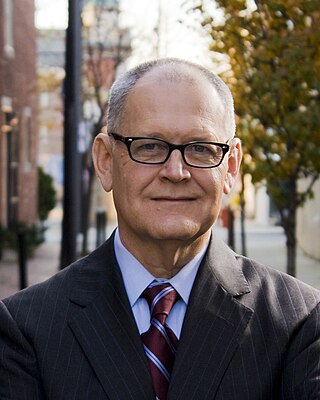
Maxwell Sieben Baucus is an American politician who served as a United States senator from Montana from 1978 to 2014. A member of the Democratic Party, he was a U.S. senator for over 35 years, making him the longest-serving U.S. senator in Montana history. President Barack Obama appointed Baucus to replace Gary Locke as the 11th U.S. Ambassador to the People's Republic of China, a position he held from 2014 until 2017.
Single-payer healthcare is a type of universal healthcare in which the costs of essential healthcare for all residents are covered by a single public system.

The Medicare for All Act, aka the Expanded and Improved Medicare for All Act or United States National Health Care Act, is a bill first introduced in the United States House of Representatives by Representative John Conyers (D-MI) in 2003, with 38 co-sponsors. In 2019, the original 16-year-old proposal was renumbered, and Pramila Jayapal (D-WA) introduced a broadly similar, but more detailed, bill, HR 1384, in the 116th Congress. As of November 3, 2019, it had 116 co-sponsors still in the House at the time, or 49.8% of House Democrats.
The Healthy Americans Act(HAA), also known as the Wyden-Bennett Act, is a Senate bill that had proposed to improve health care in the United States, with changes that included the establishment of universal health care. It would transition away from employer-provided health insurance, to employer-subsidized insurance, having instead individuals choose their health care plan from state-approved private insurers. It sought to make the cost of health insurance more transparent to consumers, with the expectation being that this would increase market pressures to drive health insurance costs down. The proposal created a system that would be paid for by both public and private contributions. It would establish Healthy Americans Private Insurance Plans (HAPIs) and require those who do not already have health insurance coverage, and who do not oppose health insurance on religious grounds, to enroll themselves and their children in a HAPI. According to its sponsors, it would guarantee universal, affordable, comprehensive, portable, high-quality, private health coverage that is as good or better than Members of Congress have today; A 2008 preliminary analysis by the Congressional Budget Office concluded it would be "essentially" self-financing in the first year that it was fully implemented.
Healthcare reform in the United States has a long history. Reforms have often been proposed but have rarely been accomplished. In 2010, landmark reform was passed through two federal statutes: the Patient Protection and Affordable Care Act (PPACA), signed March 23, 2010, and the Health Care and Education Reconciliation Act of 2010, which amended the PPACA and became law on March 30, 2010.
In the United States, health insurance marketplaces, also called health exchanges, are organizations in each state through which people can purchase health insurance. People can purchase health insurance that complies with the Patient Protection and Affordable Care Act at ACA health exchanges, where they can choose from a range of government-regulated and standardized health care plans offered by the insurers participating in the exchange.
The history of health care reform in the United States has spanned many decades with health care reform having been the subject of political debate since the early part of the 20th century. Recent reforms remain an active political issue. Alternative reform proposals were offered by both of the major candidates in the 2008, 2016, and 2020 presidential elections.
The healthcare reform debate in the United States has been a political issue focusing upon increasing medical coverage, decreasing costs, insurance reform, and the philosophy of its provision, funding, and government involvement.
The proposed America's Affordable Health Choices Act of 2009 was an unsuccessful bill introduced in the U.S. House of Representatives on July 14, 2009. The bill was introduced during the first session of the 111th Congress as part of an effort of the Democratic Party leadership to enact health care reform. The bill was not approved by the House, but was superseded by a similar bill, the proposed Affordable Health Care for America Act, which was passed by the House in November 2009, by a margin of 220-215 votes but later abandoned.

Wendell Potter is an American advocate for health insurance payment reform, New York Times bestselling author, and former health insurance industry communications director. A critic of HMOs and the tactics used by health insurers, Potter is also a leading national advocate for major reforms of the health insurance industry, including Medicare for All and universal health care.
The public health insurance option, also known as the public insurance option or the public option, is a proposal to create a government-run health insurance agency that would compete with other private health insurance companies within the United States. The public option is not the same as publicly funded health care, but was proposed as an alternative health insurance plan offered by the government. The public option was initially proposed for the Patient Protection and Affordable Care Act, but was removed after independent Connecticut senator Joe Lieberman threatened a filibuster.

The President of the United States Barack Obama discussed his plan for health care reform in a speech delivered to a joint session of the 111th United States Congress on September 9, 2009 at 8:00 PM (EDT). The speech was delivered to Congress on the floor of the chamber of the United States House of Representatives in the United States Capitol. House Speaker Nancy Pelosi presided over the joint session and was accompanied by the President of the United States Senate, Joe Biden, the Vice President of the United States. Energy Secretary Steven Chu was chosen as the designated survivor and did not attend the speech.
The America's Healthy Future Act was a bill proposed by Democratic Senator Max Baucus of Montana, who chaired the Senate Finance Committee, on September 16, 2009. It is also colloquially known as the Baucus Health Bill, the Baucus Health Plan, or BaucusCare. Baucus initially publicly released a 223-page summary of the proposal. It started going through the Senate mark-up process on September 22. That amendment process finished Oct. 2, and was passed by the Finance Committee on October 13 by a 14 to 9 vote,. An October CBO report stated that enacting the proposal would, on net, end up reducing the federal deficit by $81 billion over the 2010–2019 period.
A health insurance mandate is either an employer or individual mandate to obtain private health insurance instead of a national health insurance plan.
There were a number of different health care reforms proposed during the Obama administration. Key reforms address cost and coverage and include obesity, prevention and treatment of chronic conditions, defensive medicine or tort reform, incentives that reward more care instead of better care, redundant payment systems, tax policy, rationing, a shortage of doctors and nurses, intervention vs. hospice, fraud, and use of imaging technology, among others.

The Affordable Care Act (ACA), formally known as the Patient Protection and Affordable Care Act and colloquially known as Obamacare, is a landmark U.S. federal statute enacted by the 111th United States Congress and signed into law by President Barack Obama on March 23, 2010. Together with the Health Care and Education Reconciliation Act of 2010 amendment, it represents the U.S. healthcare system's most significant regulatory overhaul and expansion of coverage since the enactment of Medicare and Medicaid in 1965.
The Affordable Care Act (ACA) is divided into 10 titles and contains provisions that became effective immediately, 90 days after enactment, and six months after enactment, as well as provisions phased in through to 2020. Below are some of the key provisions of the ACA. For simplicity, the amendments in the Health Care and Education Reconciliation Act of 2010 are integrated into this timeline.
Health Republic Insurance of New York was a not-for-profit health insurance cooperative in New York State.

The American Health Care Act of 2017 was a bill in the 115th United States Congress. The bill, which was passed by the United States House of Representatives but not by the United States Senate, would have partially repealed the Affordable Care Act (ACA).
The Patient Protection and Affordable Care Act, often shortened to the Affordable Care Act (ACA) or nicknamed Obamacare, is a United States federal statute enacted by the 111th United States Congress and signed into law by President Barack Obama on March 23, 2010. Together with the Health Care and Education Reconciliation Act of 2010 amendment, it represents the U.S. healthcare system's most significant regulatory overhaul and expansion of coverage since the passage of Medicare and Medicaid in 1965. Once the law was signed, provisions began taking effect, in a process that continued for years. Some provisions never took effect, while others were deferred for various periods.



